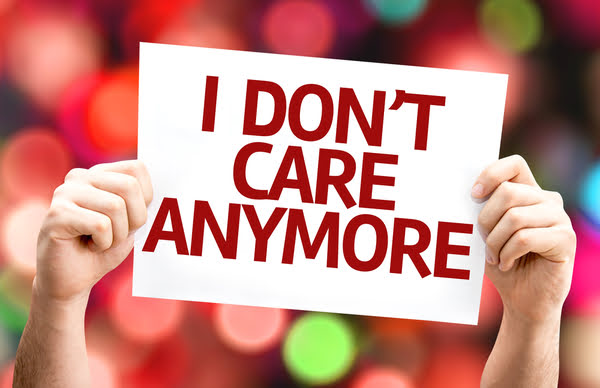Why do we stop caring?
The answer to that question lies in the understanding of why we care. When we care about something, we give our attention, energy, time, and interest to it.

Why?
To get something in return.
After all, attention, energy, time, and interest are all precious resources. We don’t want to squander them. So, an expectation of a return is woven into the very fabric of caring.
Caring equals investing. No one wants to make a bad investment. If you’ve invested in a failing business, you’d quickly stop investing.
Similarly, we stop caring when we realize that we’re not going to get the return we were expecting.
Reasons we stop caring
Now that we’ve got the basics out of the way, let’s look at some specific reasons why people stop caring. You’ll note that they all tie back together to the ‘violation of expectations’ concept.
1. Disappointment
Disappointment is nothing but a violation of positive expectations. If you study hard for an exam, you expect to crack that exam. If you don’t, you’re disappointed. If you try hard again and fail again, you’re like:
“I’m done. I don’t care anymore.”
What you’re really saying is:
“I want to stop investing my time and energy in something with no return.”
2. Emotional pain
While disappointment is a form of emotional pain, it’s not nearly as painful as when your ego gets hurt.
Continuing with the above example, if your ego is attached to getting good scores on a test and you fail the test, you need a way to fix your emotional pain.
One way to do that is to declare that you don’t care about exams at all. That way, you protect your ego in a pre-emptive manner.
When your emotional pain exceeds a threshold, your mind shuts down and becomes numb. This numbness is similar to the numbness you feel when you’re physically hurt. It’s your body’s way of protecting you from further pain.
Emotional numbness and not being emotionally invested anymore protect us from further emotional pain.
3. Resource management
When you take money out of a failing business, you can invest it in a business that is more likely to yield a return.
Similarly, when you stop caring about something, you can invest that ‘care’ into something else with a greater likelihood of return.
That’s why it’s common to hear people say:
“I just don’t care about relationships anymore. I want to focus on my career.”
“I just don’t care about friendships anymore. I want to devote time to my relationship.”
4. Coping mechanism
Like emotional pain, stress can be intolerable and can overburden our minds. Stress is usually caused when we have to process too much information. When that happens, we’re likely to throw our hands in the air and say:
“I don’t care! I’m done!”
What we’re really saying in this scenario is:
“I can’t handle the things life’s throwing at me. I need a break.”
When you take that break, you withdraw your ‘care’ from unimportant things and divert it to more important things that need immediate attention.
5. Depression
Chronic stress and prolonged unsolved problems lead to depression. At its core, depression is an extreme case of a violation of expectation. People get depressed when their lives aren’t what they expected.
Apathy or not caring is a common feature of not only depression but many other disorders. But apathy is not the same as depression. It’s a different mental state than depression.
But the goal of these two mental states overlaps.
They’re both designed to stop you in your tracks and make you re-evaluate your life so you can shift to a different path.
6. Anhedonia
Anhedonia, another depression feature, is the inability to feel pleasure. When you’re depressed, you no longer derive pleasure from what you usually find pleasurable.
This, again, is a ‘resource management strategy’ of the mind. If you had no anhedonia when depressed, you’d be spending time and energy indulging in your hobbies versus addressing your life problems.
7. Existential crisis
If you’re going through an existential crisis, you’ve probably concluded that nothing matters. Nothing has meaning. Since we’re meaning-seeking organisms, this violates a fundamental expectation that we all have about life- that it must be meaningful.
When you just don’t care anymore in a relationship
People have great expectations from relationships and marriages. When those expectations aren’t met repeatedly, they stop caring about relationships. They may choose to take a break from dating and relationships.
Apathy can also creep in when you’re in a relationship. You stop caring if you consistently find that you care for your partner while they don’t. You stop being emotionally invested, not only because you’re getting no return but also to protect yourself from emotional pain.
When you just don’t care about work anymore
When selecting jobs, a common mistake is to overvalue salary and benefits and undervalue other aspects of the job.
If you have a job that pays well but drains you mentally, you can eventually stop caring about it.
You may have tried to fix the downsides of your work, but your seniors dismissed your suggestions. So, you stay at the job for the salary and benefits but no longer care about improving it.
When you just don’t care about anything anymore
This can be a sign that your expectations have been violated in multiple life areas. Everything is not what you wanted it to be, so you don’t care about anything anymore.
It may also be a sign of an existential crisis. If you believe nothing has meaning, you think nothing is worth caring about.
